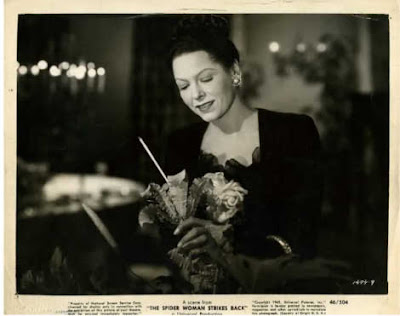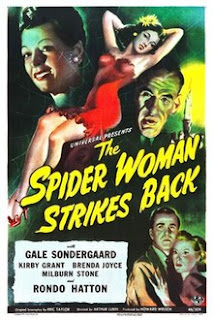This film has so much promise but the delivery
never quite takes advantage of it. Universal had plans to make the Spider
Woman of the Sherlock Holmes film into a series. At the end of The Spider
Woman she walks off with the cops to the jailhouse. She was one of Holmes's
better opponents and played by Gale Sondergaard, she had a sense of dread
around her and Universal saw potential there. How interesting would that
have been to have a series about her though I don't know how that would have
worked with the movie code where bad guys and girls could not get away with
crimes. Maybe that is why it never came off - they would have had to turn
her into a reformed character like they did with The Saint, The Lone Wolf
and the Crime Doctor and what would have been the point. We want her evil
and scheming.
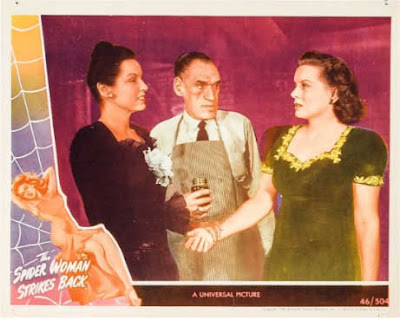
So as these things evolve over a few years they came up with this which has
no relation to the character in the Holmes film but have a title that will
make people think so. Very clever. In this one Sondergaard plays Zenobia,
a wealthy blind woman living in the old family home with a manservant to
care for her. Everyone has the nicest things to say about her and her philanthropic
activities. Poor blind woman but so kind. She also hires companions to read
to her every night and help her around. And gives them a warm glass of milk
before they sleep. Jean (Brenda Joyce) is hired for the job. She used to
live in this small town but moved away years ago - probably to get away from
her persistent suitor played by Kirby Grant out of his Mountie uniform for
a change (he was in a series of films in which he played a Canadian Mountie).
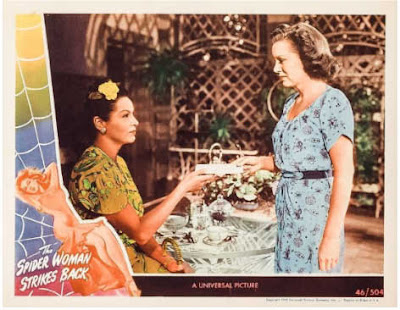
Jean is in for a bit of a shock when she knocks on the front door and it
is opened by the servant - played by Rondo Hatton whose face has kept many
a child up at night. In real life he was gassed in WWI and this led to the
development of "Acromegaly (a disorder of the pituitary gland) causes deformation
of bones in the head, hands and feet, and internal and external soft tissues.
The body resumes production of growth hormone, but as the bone structure
can no longer continue symmetric growth (as in giantism)." It led to a Hollywood
career but also an early death soon after this film was finished.
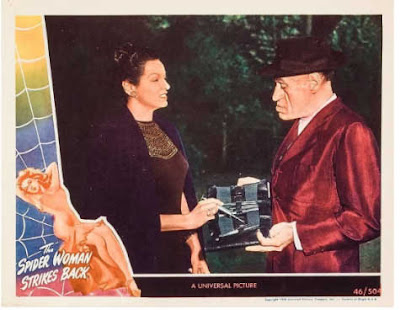
But things are going fine in the household - the sweet Zenobia is easy to
take care of though a bit obsessed with Jean having that milk before bed
time. "Adults need it too. Our bones are still growing". Deep sleeps. Jean
wonders why all the other companions have left. "Oh various reasons". Like
dying. In a very convoluted scheme Zenobia is taking the blood of the companions
as they sleep at night and feeding it to her voracious plants in the cellar
- along with spiders - she is a proud mother watching (clue) her plants devour
the blood and bugs. Why? Well, that is a mystery I will leave you with but
there had to be a better way to complete her plans than killing a bunch of
women. I mean is the plant so particular that it needs human blood? Cow blood
would not have worked? The first 30 minutes of this is quite delicious -
a noir feel, a strange tapping at night, Jean getting weaker by the day,
Rondo sneaking around in the dark but then it kind of wanders off the ranch.
It is only 60 minutes. Directed by Arthur Lubin. In comments neither he nor
Sondergaard had anything good to say about this film. It is not that bad
but it should have been better. Sondergaard is such a lovely malevolent presence
in nearly all her films - yet attractive in a way. Like too many she was
a victim of the despicable HUAC witch trials and was blacklisted and didn't
work in a film from 1950 to 1968. Swine.
